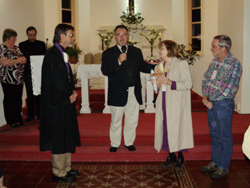On Oct. 9, two Latin American denominations, both mission partners of the Presbyterian Church (U.S.A.), merged at an assembly in Argentina's agricultural heartland.
The merger of the Evangelical Church of the River Plate (IERP) and the Reformed Churches in Argentina (IRA) was witnessed by more than 200 delegates, including ministers, lay leaders, youth delegates and theology students. They were gathered for the IERP's 39th Synod Conference to approve the merger.
IERP, present in about 250 communities and with 25,000 members, was founded in 1899 by German-speaking immigrants. IERP has churches in Argentina, Uruguay and Paraguay.
The IRA, founded in 1893 by Dutch-speaking immigrants, has 13 congregations and about 2,500 members.
The Rev. Carlos Duarte, a Uruguayan pastor, was elected to a four-year term as president of the united denomination, called the Evangelical Church of the River Plate (IERP). IRA churches will conserve their identity as a group within the new structure.
Duarte also serves as a member of the Central Committee of the World Council of Churches. The newly elected board, made up of four women and five men, five lay people and four clergy, includes one member of the IRA.
IRA President the Rev. Gerardo Oberman noted that "for years we have worked to bring our two churches together so that we might offer a testimony of unity to all churches in the River Plate region. We are creating spaces of encounter where churches from each tradition will be able to offer our gifts for ministry while also learning from the other."
For the last decade, the IRA and the IERP have been mission partners of the PC(USA). The PC(USA) Hispanic Caucus has a mission partnership with IRA, and Tres Rios Presbytery is exploring a partnership with the newly merged denomination.
The Rev. Jobeth Tice McLeod, pastor of First Presbyterian Church of Alpine, Texas, observed: "It has been a great honor to represent Tres Rios Presbytery and the PC(USA) at this union of two denominations that work in three countries. I take home a renewed spirit of cooperation and fellowship to share with our churches in the United States. It has also been a pleasure to find new friends and colleagues in the Reformed tradition in South America."
At the closing worship, McLeod presented Duarte with a triple cross made of clothespins, crafted by children in her church.
"This cross represents the down-to-earth tasks that make up so much of what we do as pastors: taking time to listen to people and to share Christ's love with them in practical acts of service. It also represents the three countries in which you minister," she said.
Also representing the PC(USA) at the Assembly was Dennis Smith, soon to be PC(USA) regional liaison for the Southern Cone and Brazil.
Commented Smith: "In today's fragmented world, the integration of these two churches and their careful attention to the pastoral challenges facing the River Plate region is a sign of hope to all people of faith."
The theme of the assembly was urban ministry. Latin America’s urban areas are growing rapidly as young people abandon rural regions to seek educational and economic opportunity in the cities.
Built around the prophet Jeremiah's admonition to "seek the welfare of the city where I have sent you" (29:7), participants looked at how the church can be a space for community and identity in the turbulent anonymity of the city. Participants also noted how ministry to urban youth must take into account rapid social and technological change and understand the importance of using social media such as Facebook and YouTube to build relationships.
Both denominations represent the remarkable melting pot that is the River Plate region, where Italian, German, Dutch and many other immigrants arrived en masse in the late 19th century. As in the United States, the immigrants have become integrated into Argentine, Uruguayan and Paraguayan culture. The faith communities brought by immigrants became the heart of each community and helped preserve their language, history and cultural identity.
Also similar to the United States, the massive influx of European immigrants pushed the small surviving indigenous population into ever-more marginal living conditions.
As each immigrant community has become more integrated into local culture, Spanish has supplanted their traditional language and the tango has joined Bach in worship. Over the decades, the pastoral vision of both IERP and IRA has turned to living out the Gospel in the larger community in evangelism and service.
Other ecumenical partners present at the assembly included the World Council of Churches, the Latin American Council of Churches, the Lutheran World Federation, the World Communion of Reformed Churches and the Christian Reformed Church in North America.

